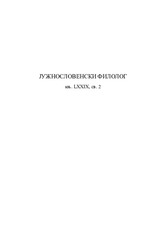«... IMPRIMI SICUT NATIONI RUSSICAE DECORI & UTILITATI FORET ...»: РОЛЬ ПРОСВЕТИТЕЛЬСКОЙ ДЕЯТЕЛЬНОСТИ НЕМЕЦКИХ ПИЕТИСТОВ В РОССИИ НАЧАЛА XVIII ВЕКА И ИХ ВКЛАД В ФОРМИРОВАНИЕ РУССКОЙ ПРОФЕССИОНАЛЬНОЙ ТЕРМИНОЛОГИИ
“… IMPRIMI SICUT NATIONI RUSSICAE DECORI & UTILITATI FORET …”: THE ROLE OF GERMAN PIETISTS’ EDUCATIONAL ACTIVITIES IN THE EARLY EIGHTEENTH-CENTURY RUSSIA AND THEIR CONTRIBUTION TO THE FORMATION OF RUSSIAN PROFESSIONAL TERMINOLOGY
Author(s): Swetlana Mengel, Maria Cristina BragoneSubject(s): Historical Linguistics, Eastern Slavic Languages, Translation Studies, Sociology of Religion
Published by: Институт за српски језик Српске академије наука и уметности
Keywords: German Pietism; 18th century; fi rst Russian grammars; first translations into Russian; formation of Russian Lutheran ecclesiastical terminology;
Summary/Abstract: The movement of Pietism, which emerged in Germany in the progressive Protestant milieu in the late 17th century, called for a reform of the Reformation. In order to make the idea of “true Christianity” and “true piety” accessible and understandable to every ordinary believer, it set as its primary goal the universal enlightenment of the nations necessary for every Christian to read and understand the full text of the Holy Scriptures. The realization of this goal included the translation of the full text of the Bible into the national languages and its distribution in the form of printed editions. The quote in the title of this article is from the preface to the very fi rst grammar of the Russian language (LUDOLF 1696, see [3 (A)]), showing that the “printing” of “good books” in Russian was not only envisioned by the Pietists, but should, in their opinion, serve “for the beauty and benefi t of the Russian nation”. In addition to the creation of the fi rst grammars of the Russian language, which had not existed until then, the enlightenment activities of the Pietists in Russia encompassed the production of translations of Western European literature into Russian from various fi elds of knowledge – pedagogy, history, theology, etc., which led to the creation of a new vocabulary in Russian, including the fi eld of naming professions and specialized terminology. In the proposed article these processes are shown, on the one hand, on the example of a brief analysis of the fi rst grammars of the Russian language, created by German Pietists; on the other hand, on the example of translation of the statutes of Lutheran churches and schools in Russia, the formation of a special Russian ecclesiastical terminology in the fi eld of religious life of Lutherans is considered.
Journal: Јужнословенски филолог
- Issue Year: 79/2023
- Issue No: 2
- Page Range: 29-62
- Page Count: 34
- Language: Russian

